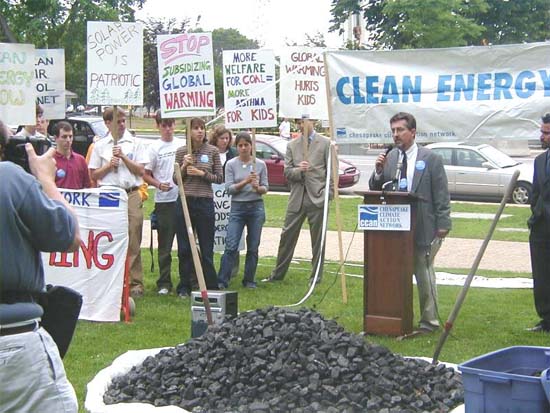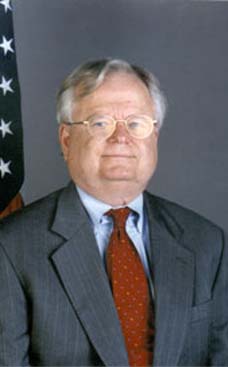
"Dismissing the importance of small personal behavior choices in favor of a sole focus on policy changes is a big mistake. Small behaviors are important not only for the direct environmental impact they have, but because they often lead to more and more pro-environmental behaviors over time. Research shows that personal action and political action to protect the environment go hand in hand, rather than undermining each other. When people do something like buy a more expensive and perhaps less aesthetically pleasing compact fluorescent lightbulb, they justify it to themselves and others. This tends to result in changes in their self-perceptions (I am a person who cares about fighting global warming), their beliefs (global warming is a really important problem), and how others see them (they really care about the environment)." Author Mike Tidwell, founder of the Chesapeake Climate Action Committee, served as a Peace Corps Volunteer in Congo Kinshasa.
Social scientists respond to Mike Tidwell
The power of voluntary actions
Social scientists respond to Mike Tidwell
Posted by David Roberts at 3:03 PM on 11 Sep 2007
The following is a guest essay in response to Mike Tidwell's recent piece on Grist, "Consider using the N-word less." It is signed by a collection of social scientists, mostly psychologists. Their names are listed at the bottom.
----
We agree that institutional and policy changes are needed in addition to personal behavior changes, and that some pro-environmental behaviors being promoted aren't the ones that have the most impact. Unfortunately, Tidwell implies that voluntary behavior change and policy change are mutually exclusive options, and that the only personal behavior that matters for the environment is political action.
Any volunteers? Photo: iStockphoto
We strongly disagree, and we were surprised to see this argument featured so prominently in Grist, which normally supports voluntary behavior change through helpful columns such as Ask Umbra. To fight global warming, individual and institutional behavior change is needed, whether the change is produced by voluntary action or mandated by legislation.
Dismissing the importance of small personal behavior choices in favor of a sole focus on policy changes is a big mistake. Small behaviors are important not only for the direct environmental impact they have, but because they often lead to more and more pro-environmental behaviors over time. Research shows that personal action and political action to protect the environment go hand in hand, rather than undermining each other. When people do something like buy a more expensive and perhaps less aesthetically pleasing compact fluorescent lightbulb, they justify it to themselves and others. This tends to result in changes in their self-perceptions (I am a person who cares about fighting global warming), their beliefs (global warming is a really important problem), and how others see them (they really care about the environment).
The more people voluntarily engage in pro-environmental behaviors and justify it themselves and others, the more it creates social pressure to do good things for the environment. Numerous psychological studies have shown that people are more likely to agree to take a big action if they've previously agreed to smaller, similar actions. Thus, changing a light bulb may lead to higher impact behaviors like giving up plastic water bottles, insulating one's house, living closer to work, reducing meat consumption, and actively supporting legislation that will likely require personal sacrifice. When ExxonMobil hears about people changing lightbulbs and buying Priuses, they should expect public policy changes to follow.
Social and natural scientists need to work together to clarify which actions, including political action, have the most impact, and be sure to include these on the "10 things you can do" lists. Supporting policies that will require drastic changes in one's lifestyle is a difficult behavior, and will be much more likely after people have already made the choice to carry out other pro-environmental behaviors.
Another benefit of giving people an immediate, easy way to get started fighting global warming is that it may make them more willing to accept the evidence that global warming is a major problem. People reject scary messages like the danger of global warming if they don't think there is anything feasible they can do to fix it. They are understandably motivated to minimize their distress, so they'd rather be in denial than feeling anxious and helpless. In contrast to racial discrimination, where people of color are treated differently for an obvious (though unjustified) reason, global warming is not yet obvious and it is hard for people to understand.
Given this, there is plenty of room for people to reject the whole concept if they are motivated to do so. Environmental appeals need to provide more emphasis on what people can do to make a difference, not less. Too many global warming appeals -- including the otherwise excellent An Inconvenient Truth and a recent television ad showing a child about to be run over by the "freight train" of global warming -- scare the heck out of people, and only leave "what you can do" as an afterthought. Thus, "10 things you can do" may help people accept and act on the scary global warming message.
It is also important to keep in mind that restrictive policies are not without their problems. First, they're difficult to pass if the electorate isn't already convinced of the magnitude and urgency of the problem. Witness the massive unpopularity of carbon taxes. Second, restrictive policies engender resentment and actions to restore threatened freedoms, such as ditching the policies themselves or creative disobedience. Witness efforts to dismantle the Endangered Species Act, and the creative efforts to skirt its requirements. Third, high impact policy ideas often get watered down in the political process, so the resulting policy isn't nearly as effective as the original idea. For example, CAFE standards can help -- but only if they're high enough.
Finally, being forced to do something by an authority often undermines other reasons why people engage in pro-environmental behaviors. For example, if a person starts biking to work to reduce their carbon footprint and enjoy the exercise, but then a law tells them they can't drive, they may start thinking that they only bike because of the law. This can be bad if the restrictive policy ever goes away -- so does the desired behavior. Policy changes will be necessary due to the magnitude of the problem, but these policies should be carefully crafted so that they produce the pro-environmental behavior change that lasts.
The history of racial policy and WWII demonstrate the importance of both policy and voluntary actions. Much public debate and many small individual actions transpired to make racial discrimination less and less socially acceptable in the century and a half before LBJ signed the Civil Rights Act. Try telling descendents of those rescued by the underground railroad that it didn't matter. Even in the more urgent crisis of WWII, in addition to the mandatory policies, mass persuasion campaigns encouraged voluntary actions. Politicians realized they needed public support for the war effort, and for legislation. Remember the "We can do it!" poster encouraging women to join the labor force? The victory gardens? Voluntary actions provided direct physical support, strengthened the norm of supporting the war effort, and boosted morale. Both voluntary action and policy changes were crucial to winning the war.
Finally, if articles such as Tidwell's tell people their actions don't matter, they may undermine any action to fight global warming at all, including political action. Immediate, small steps toward sustainability are surely better than no steps at all. And hypocrisy also gives ammunition to opponents of environmental legislation -- many may ask, why should I support a law asking me to sacrifice when those hypocritical environmentalists aren't even walking the walk? De-emphasizing personal actions may make us feel better -- "fixing the problem is the politicians' job, not ours" -- but it is delusion. To fight global warming in a democracy, we must do everything we can as individuals, including changing our lifestyles to reduce their impact on the environment and working for better policies. Policy is but one tool for producing the behavior change needed to halt global warming. Given the magnitude of the problem, all tools are needed.
Amara Brook, Ph.D., Santa Clara University
Susan Clayton, Ph.D., The College of Wooster
Gene Myers, Ph.D., Western Washington University
Joseph Reser, Ph.D., University of Durham, UK; Griffith University, Australia; James Cook University, Australia
Marte Fallshore, Ph.D., Central Washington University
Peter Kahn, Ph.D., University of Washington
John Scull, Ph.D., Cowichan Community Land Trust
Carol Saunders, Ph.D., Chicago Zoological Society
Christie Manning, Ph.D., University of St. Thomas
Joe Heimlich, Ph.D., The Ohio State University
Lance Olsen, Independent
Elise L. Amel, Ph.D., University of St. Thomas
Emily Chan, Ph.D., Colorado College
Kathleen L. Wolf, Ph.D ., University of Washington
Laura Johnson, Ph.D., University of Mississippi
Susan Johnson, Ph.D., University of North Carolina at Charlotte
Scott Finlinson, Ph.D., NORESCO
John Thøgersen, Ph.D, Dr. Merc., University of Aarhus, Denmark
Stephen Zavestoski, Ph.D., University of San Francisco
Kate Irvine, Ph.D., De Montfort University, UK
Gareth Davey, Ph.D., University of Chester, UK
Sarah M. Bexell, Ph.D., Chengdu Research Base of Giant Panda Breeding, China
John Fraser, AIA, Wildlife Conservation Society Institute
Ethel Tobach, Ph.D., American Museum of Natural History
Kathryn Ross Wayne, Ph.D., Western Washington University
Peter Alexander, M.S., Biodiversity Project
Michelle Verges, Ph.D., Indiana University



















